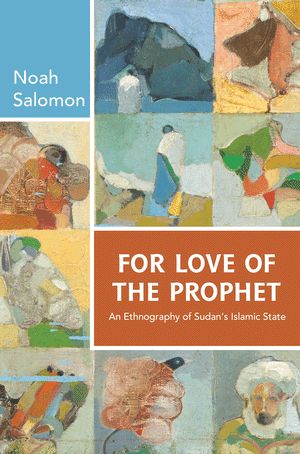Has the United States been a source of good in the world? Weak theology assumes a position of service to the vulnerable as the point of redemptive activity. A strong theology would…
Latest posts
For Love of the Prophet  by
Abdulkader Tayob
by
Abdulkader Tayob
The rhetoric of Islamic politics in local and global dimensions
 by
Abdulkader Tayob
by
Abdulkader Tayob
Noah Salomon’s ethnography of politics provides a penetrating insight on the far-reaching effects of the Islamic state project in the Sudan. It is a welcome study of an Islamic state that is more than two decades old, at a time when a new experiment in the Levant seems to overwhelm the global imagination. The older models, including the Pakistani, the Iranian, the Libyan, and earlier still the Saudi, provide food for thought of Islamic politics in its local and global manifestations. These earlier projects offer a longer-term perspective of political projects in the face of continuing challenges in Muslim societies. These include questions of diversity, legitimacy, economic prosperity, deep inequalities, ever-present foreign interventions that constitute our global world, and fractured religious identities. Salomon’s monograph is a close interrogation of Sudan’s Islamic state, particularly in the responses that it generates from other Islamic actors. Through this ethnography, he explores other kinds of politics and other kinds of publics that unfold in response to the state’s project that was launched in 1989.
March 30, 2017
Essays
Scholar or retailer of import goods? Reza Aslan, his guru, and his critics
March 28, 2017
“I came to Varanasi India to do a show about Hinduism, about karma, reincarnation, the caste system, and a little known Hindu sect called the Aghori. That’s when things got out of…
March 28, 2017
For Love of the Prophet  by
Kabir Tambar
by
Kabir Tambar
When is the Islamic state? Historical time and the agenda of Islamic studies
 by
Kabir Tambar
by
Kabir Tambar
From the Islamic revolutions in Iran (1978-79) and Sudan (1989) to the recent emergence of ISIS, the concept of an Islamic state is often greeted in North America and Western Europe with a distinct historical anxiety, as a phenomenon of pre-modernity erupting in our midst. Scholars of Islamic studies have long countered that in fact these entities are constituted squarely within the discourses and institutions of the modern state: the movement in Iran, for instance, followed the longstanding revolutionary-national tradition in claiming that it acted on behalf of the will of “the people,” and the Sudanese leadership embraced the idea of civilizing a pre-modern religiosity, a project that has been a hallmark of Enlightenment thought. Nation-states that claim to derive their law from Islam still typically codify sharia in the format of a constitution, often drawing on the conventions and language of international law as a guide. In reminding readers of these points, scholars of Islamic studies challenge the relegation of Islamic politics to pre-modernity. But in showing the many ways in which actual political practices in the Muslim world remain within the fold of modernity, this line of critique risks reinscribing the same temporal division, leaving it in place as the very condition of intelligibility of Islamic politics. How might a different understanding of historical time reorient the agenda of Islamic studies?
March 22, 2017
Essays
“I am not a racist, but . . .”: The perversity of the recent ECJ ruling on the “headscarf issue”
March 20, 2017
It is by now commonplace that ostensibly “neutral” language—such as the notorious preamble “I am not a racist, but . . .”—can serve to mask or justify covert forms of discrimination. Yet,…
March 20, 2017
For Love of the Prophet  by
Iza Hussin
by
Iza Hussin
New itineraries in the study of Islam and the state
 by
Iza Hussin
by
Iza Hussin
From Wael Hallaq’s The Impossible State to Shahab Ahmad’s What is Islam?, recent scholarship on Islam and the state has been enriched by studies that seek to interrogate the boundaries of the concept and to push scholars in multiple fields to explore new empirical and analytic possibilities for an old question. Working from quite different theoretical and textual presuppositions, both Hallaq and Ahmad make the argument that we begin with where the Islamic is not: the Islamic is not to be found in the legal and governmental institutions of the modern nation state. Noah Salomon makes a powerful case for a different starting point, grounded in ethnography: “What are we to make of Hallaq’s impossible state when it in fact becomes a practical possibility?” With admirable transparency, he notes what many of us have encountered in the field: “When I arrived in Sudan, I made the rather unsettling discovery that I could not find the state in the places where I had expected it to be.” Salomon finds the Islamic state not in government buildings, but in the logics and conduct of daily life, “structuring the landscape of discourse and debate on which diverse expressions of contemporary Sudanese life takes place.”
March 16, 2017
Load more












